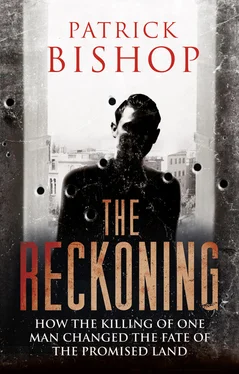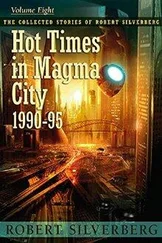Martial law was imposed and henceforth rebels were tried by military courts which could impose death sentences for the mere possession of a firearm. The Palestine garrison had been steadily reinforced since the troubles and was now 20,000-strong.
The most important element in the struggle against unrest was not the army but the police. The Palestine Police Force (PPF) was set up in 1920 with a core of British officers controlling a much larger native force of Arabs and a smaller number of Jews. It had failed to prevent, and struggled to contain, the persistent outbreaks of violence. Late in 1937 two colonial police veterans, Charles Tegart and David Petrie, were brought in to devise a strategy against the revolt and to carry out reforms.
Their most dramatic proposals were to build a network of reinforced concrete forts at key points around Palestine and a barbed-wire barrier along its northern and eastern frontiers to stem the flow of arms, fighters and supplies from Lebanon, Syria and Iraq. They also called for the strengthening of the Criminal Investigation Department. It was clear that the police would continue to play the lead role in gathering information about political subversion in Palestine. They, after all, lived in the place and were kept up to date on the moods and machinations of the Arab and Jewish communities via their local employees. The RAF had a permanent presence in the country and air force intelligence officers made some contribution to the information picture. The army units, though, came and went, and military intelligence resources had anyway been drastically run down after the war. On the recommendations of Tegart and Petrie, the CID would be transformed into a vigorous, systematic and efficient service aimed at penetrating the workings of the multiple organizations – Jewish and Arab – that threatened to undermine the rule of the Mandate.
The authority of the British was being challenged everywhere. It was essential to demonstrate confidence and resolve and remind the local populations where the balance of power lay. As MacMichael’s train laboured up the switchback track that led through the stony slopes of the Jerusalem hills, three RAF aircraft appeared overhead once more, swooping and wheeling through the thunderclouds glowering over the Holy City. By the time it pulled into Jerusalem station at 2 p.m., the heavens had opened and when the band of the Black Watch had played a few bars of the national anthem Sir Harold and his party were whisked off to Government House.
There, in the ballroom, 200 guests were waiting. Sir Harold’s finery was matched by the costumes of many of the assembly. Soldiers, policemen and airmen were in full dress uniform. Prince Naif, son of King Abdullah, Emir of the British protectorate of Transjordan, wore Bedouin costume. The Palestine Post ’s reporter declared that it was the assembled patriarchs, priests and rabbis who ‘presented the most striking picture, rivalled only by the Moslem religious dignitaries in their red tarbushes, white turbans and black capes’. 8
They stood as Sir Harold signed the royal commission of appointment and Chief Justice Trusted, wearing full-bottomed wig and purple cape, gave his welcoming speech. According to the Post , it was ‘very brief and delivered with deliberation and emphasis’. After paying tribute to each of Sir Harold’s four predecessors in Palestine, he concluded with an observation with which the new High Commissioner was by now all too depressingly familiar: ‘Many major problems await your excellency’s consideration,’ he rumbled, ‘and we cannot doubt that you are faced with an arduous task.’
Sir Harold’s reply was short and frank. He was not going to make a speech as he had only been in Jerusalem for half an hour and was starting work in a country of which he knew ‘practically nothing’. That night, in a twelve-minute broadcast to the people he now governed, he again protested his ignorance, saying he was ‘sure of little but the incompleteness of my own knowledge of conditions and personalities’. He nonetheless laid down the principles on which he would govern. The first was ‘the duty to maintain the authority of His Britannic Majesty and the firm establishment of law and order’.
This uncompromising message was softened by a declaration of his good intentions to all. ‘The motives that will actuate me will be simple ones of good faith and honest endeavour to do what is best for all concerned with firmness and impartiality,’ he said. ‘Nor does impartiality present difficulties for me, for the problem is not one upon which I have any preconceived ideas or bias.’ 9
It was not impartiality, though, that the Arabs and Jews wanted from the British. As MacMichael would soon learn, each side would be clamouring for his undivided support. After delivery, the speech was re-broadcast in Arabic and Hebrew. There was nothing much in it to indicate to the listeners that this cold, efficient man held the key to the Palestine conundrum. Looking back over the day, the Palestine Post was reduced to taking comfort in superstition. ‘There were three good omens in connection with His Excellency’s arrival in Haifa,’ it reported on its front page. ‘A rainbow was seen over the Bay of Acre as the Enterprise drew near the harbour. As Sir Harold entered the transit shed, a dove flew the length of the building. An old Arab proverb welcoming an honoured guest says “when you came, the rain came”.’ 10
*My name is George Nathaniel Curzon/I am a most superior person/My cheeks are pink, my hair is sleek/I dine at Blenheim twice a week.
TWO
‘This Was the Job for Me’
The rainbow that arced over Haifa that day would have been visible to Geoffrey Morton as he went about his duties controlling the city’s traffic during Sir Harold’s arrival and departure. He was not the sort of man to believe in omens. Life was good. He was thirty years old, fit, happy and second in command of the Haifa urban district. His service record was crammed with seventeen commendations and in the 1937 New Year’s Honours’ List he became the first recipient of the new Colonial Police Medal in recognition of ‘distinguished and valuable services’. He had got where he was not through luck but by hard work and determination.
Haifa was a good posting, the most attractive city in Palestine. It faced onto the Mediterranean which sparkled like a sheet of sapphires in the bright daylight and glowed like molten gold in the setting sun. To outsiders it seemed blessedly civilized, a relief after Tel Aviv’s perpetual building works and Jerusalem’s unedifying religious rivalries, which were enough to put some of the devout among the Mandate’s rulers off God for ever. When the Arab revolt erupted, though, Haifa had felt the shock waves.
Morton was there for the start of the trouble. One morning in May 1936 he was dispatched to deal with a crowd of Arabs who were gathering in the souk. They waved knives and sticks and shouted anti-Jewish and anti-British slogans and were soon surging through the streets towards the District Commissioner’s offices in the middle of town.
When the main body was blocked by a police cordon, a breakaway band of troublemakers regrouped on Kingsway, one of Haifa’s main streets, and began stoning Jewish cars. Morton was one of the small squad sent to deal with them. He was wearing a steel helmet – standard riot issue. As he stood in the lee of a building discussing the situation with a fellow officer, someone dropped a coping stone from three storeys up, which caught him square on the head.
He was knocked unconscious but when he came round he carried on with his duties. The requested reinforcements did not materialize. The mob was getting ever more threatening. The senior officer present, Inspector G. F. ‘Dinger’ Ring, decided it was time for action. The Palestine Police had a detailed drill for dealing with mobs. Ring yelled out a proclamation in Arabic, calling on the rioters to go home or face the consequences. The Arabs responded with a shower of missiles. He now ordered the designated marksman in the party, Sergeant ‘Nobby’ Clarke, to move to the next step. He ‘went through the rifle drill as calmly and efficiently as if we were giving on the parade ground a demonstration of our humane methods to a delegation from the League of Nations,’ Morton recalled. 1
Читать дальше












